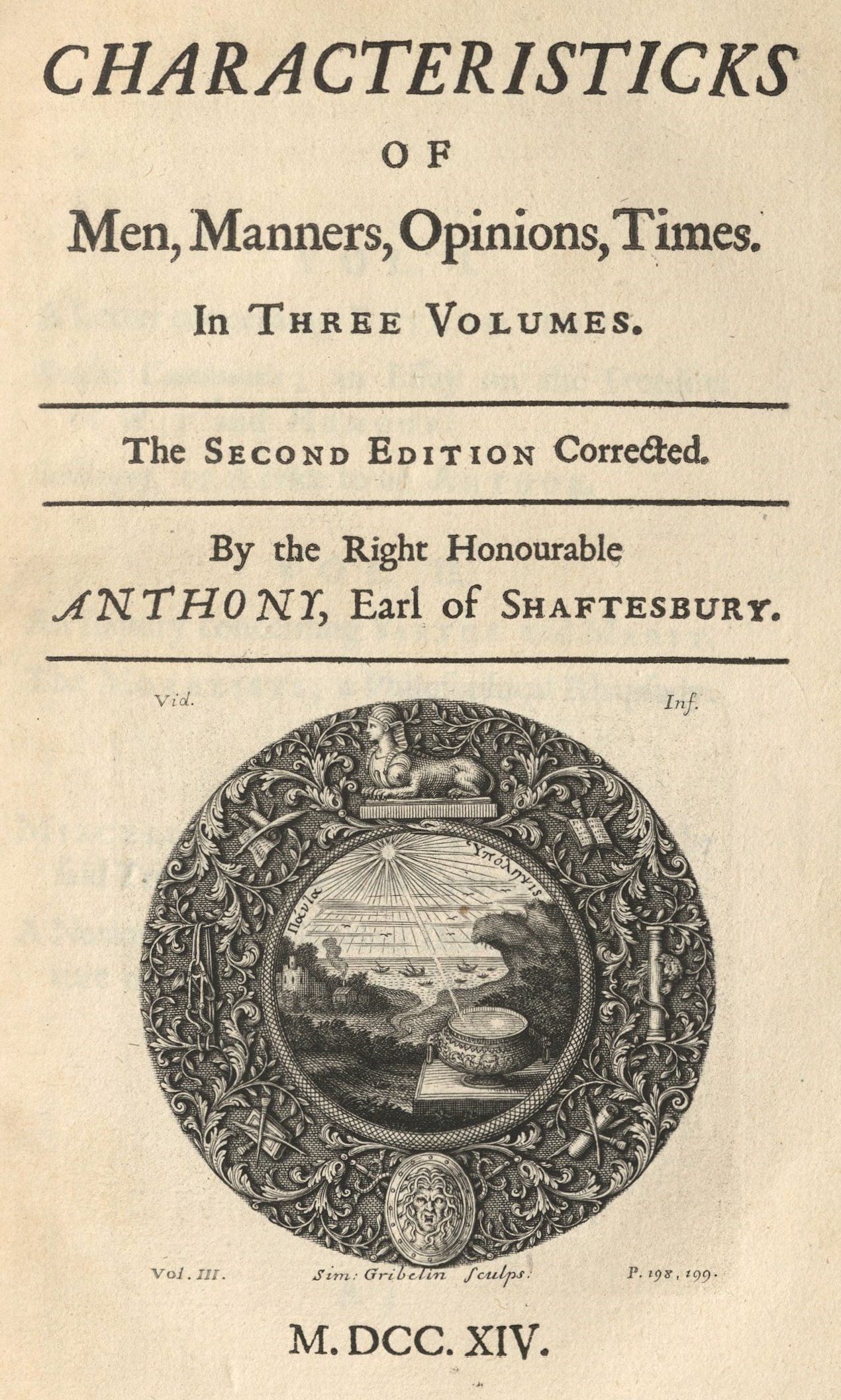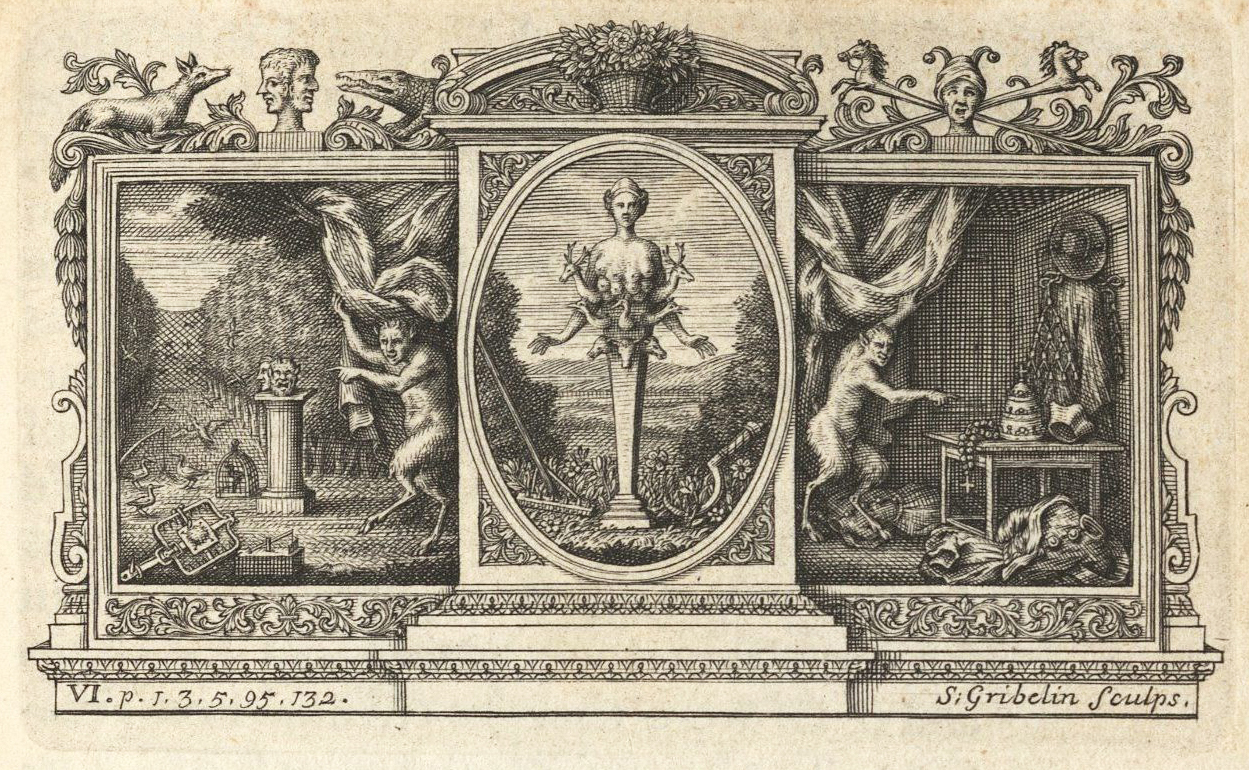Characteristicks, of Men, Manners, Opinions, Times &c.
by Anthony Ashley Cooper, Earl of Shaftesbury
| Characteristicks | |
|
Title page from Characteristicks, of Men, Manners, Opinions, Times &c, George Wythe Collection, Wolf Law Library, College of William & Mary. | |
| Author | Anthony Ashley-Cooper, 3rd Earl of Shaftesbury |
| Published | London: [Not identified] |
| Date | 1714-1715 |
| Edition | Second |
| Language | English |
| Volumes | 3 volume set |
| Desc. | 8vo (20 cm.) |
| Location | Shelf A-4 |
Cooper was single most of his life, which gave rise to questions regarding his sexuality that his own writings do not dispel.[8] He did, however, recognize his duty to his family to further his line, as evidenced by a letter to his brother, Maurice, in 1705.[9] In 1709, he married Jane Ewer, and by 1711 she bore him a son who would become Anthony Ashley Cooper, 4th Earl of Shaftesbury.[10] In the middle of 1711 he left England for good, and late that year established a residence in Chiaia, Italy. He lived there until his death in 1713.[11] His remains were returned to England and interred in the chapel of Wimborne St. Giles.[12]
Characteristicks, of Men, Manners, Opinions, Times &c., first published in 1711, comprised a collection of Cooper's more influential essays.[13] The author made extensive revisions for the second edition released over a year after his death in 1714.[14] It contained multiple engravings in the second volume, included for illustrative and demonstrative purposes.[15] Over the next 60 years, nine more editions surfaced in England.[16] The work itself was intended to serve as a guide to the reader on how to live a morally sound life, and covers a myriad of topics, from masculinity to the arts.[17] Containing nearly a quarter-million words, the manuscript itself is often split into three volumes.[18] The first volume contains what amounts to a foundation of principles that are discussed in more depth in the second volume. The third volume then contains meandering writings intended to clarify the first two volumes.[19] The work is notable for both its novel approach in addressing moralistic thinking and its influence on future philosophers. Cooper's work was one of the first of its kind to explore moral principles divorced from the typical Christian framework that often accompanied them.[20] Instead, Cooper framed his justification for moral principles based on natural propensities for affection between individuals.[21] Characteristicks, of Men, Manners, Opinions, Times &c. influenced many prominent philosophers of later generations, including David Hume and, to a lesser extent, Immanuel Kant.[22] Second only to Locke’s Second Treatise, Charackteristicks "was the most reprinted book in English in that century."[23]
While his prominence eventually declined in the 20th century, Shaftesbury was one of the most influential philosophers of the 18th century and still retains a prestigious reputation.[24] Today, Shaftesbury is remembered "as the initiator of the ‘moral sense’ school of British ethical theory."[25] Lord Shaftesbury believed that "humans appreciate order and harmony" and it was that appreciation that defined humans "judgments on beauty, morality, and religion."[26] Shaftesbury was not interested in philosophy as a purely academic pursuit; he believed it could be used to "help people lead better lives" and often wrote persuasively, for all educated people to read.[27]
Evidence for Inclusion in Wythe's Library
Listed in the Jefferson Inventory of Wythe's Library as "Shaftesbury’s Characteristics. 3.v. 12mo." and given by Thomas Jefferson to his son-in-law, Thomas Mann Randolph. Later appears on Randolph's 1832 estate inventory as "Shaftsbury's Essays 2 [vols.], $1.00." George Wythe's Library[28] on LibraryThing indicates "Precise edition unknown. Several duodecimo editions were published, the first in 1733." Brown's Bibliography[29] lists the choice of either the 2nd edition published in London (1714-715)[30] or the Foulis edition published in Glasgow (1743-1745)[31] based on copies owned by Thomas Jefferson. He also notes "Since Wythe favored published works from Foulis, he may have owned that edition. However, we cannot prove one way or the other which edition he owned."[32]
The Wolf Law Library found an available copy of the second edition (1714-1715) of Shaftesbury's Characteristics.
Description of the Wolf Law Library's copy
Bound in late 19th-century red straight-grain morocco leather in 18th-century style by Cecil & Larkins. Spines lettered in gilt, covers feature concentric gilt single-rule panels. Purchased from Peter Harrington, London, with the George Wythe Boswell-Caracci Room Acquisition Fund in honor of Drs. Dean and Grace Boswell, W&M P'86.
Images of the library's copy of this book are available on Flickr. View the record for this book in William & Mary's online catalog.
See also
References
- ↑ Lawrence E. Klein, "Cooper, Anthony Ashley, third earl of Shaftesbury (1671–1713)", Oxford Dictionary of National Biography (Oxford University Press, 2004- ), accessed December 4 2015.
- ↑ John McAteer, "The Third Earl of Shaftesbury (1671—1713)", Internet Encyclopedia of Philosophy, accessed October 23, 2023.
- ↑ Klein, "Cooper, Anthony Ashley."
- ↑ Ibid.
- ↑ Ibid.
- ↑ Ibid.
- ↑ Ibid.
- ↑ Klein, "Cooper, Anthony Ashley."
- ↑ Ibid.
- ↑ Ibid.
- ↑ Ibid.
- ↑ Ibid.
- ↑ "Shaftesbury, Anthony Ashley Cooper, 3d Earl of," in The Columbia Encyclopedia (New York, NY: Columbia University Press).
- ↑ Lawrence E. Klein, "Review of Anthony Ashley Cooper, Third Earl of Shaftesbury, Characteristicks of Men, Manners, Opinions, Times edited by Philip Ayres," 64, no. 3/4 Huntington Library Quarterly (2001): 529.
- ↑ Isabel Rivers, "Review of Anthony Ashley Cooper, Third Earl of Shaftesbury, Characteristicks of Men, Manners, Opinions, Times edited by Philip Ayres," 51, no.204 new series The Review of English Studies (Nov. 2000): 620.
- ↑ Ibid.
- ↑ Klein, "Review," 531.
- ↑ Ibid., 532
- ↑ Rivers, "Review," 617.
- ↑ Ibid.
- ↑ Ibid.
- ↑ Ibid.
- ↑ Cooper, Anthony. “Characteristicks of Men, Manners, Opinions, Times, Vol. 1.” Online Library of Liberty. Accessed October 23, 2023. https://oll.libertyfund.org/title/shaftesbury-characteristicks-of-men-manners-opinions-times-vol-1.
- ↑ McAteer, "The Third Earl of Shaftesbury (1671—1713)."
- ↑ Anthony Cooper, "Characteristicks of Men, Manners, Opinions, Times", vol. 1, Online Library of Liberty, accessed October 23, 2023.
- ↑ Michael B. Gill “Lord Shaftesbury [Anthony Ashley Cooper, 3rd Earl of Shaftesbury'], Stanford Encyclopedia of Philosophy, rev. June 1, 2021, accessed October 23, 2023.
- ↑ Ibid.
- ↑ LibraryThing, s.v. "Member: George Wythe," accessed on July 18, 2023.
- ↑ Bennie Brown, "The Library of George Wythe of Williamsburg and Richmond," (unpublished manuscript, May, 2012) Microsoft Word file. Earlier edition available at: https://digitalarchive.wm.edu/handle/10288/13433.
- ↑ E. Millicent Sowerby, Catalogue of the Library of Thomas Jefferson, (Washington, D.C.: The Library of Congress, 1952-1959), 2:13 [no.1258]. Jefferson sold a copy of the London edition to the Library of Congress in 1815, but it includes no markings suggesting prior Wythe ownership.
- ↑ Thomas Jefferson, Thomas Jefferson's Library: A Catalog with the Entries in His Own Order, ed. by James Gilreath and Douglas L. Wilson (Washington: Library of Congress, 1989): 55.
- ↑ Brown.


